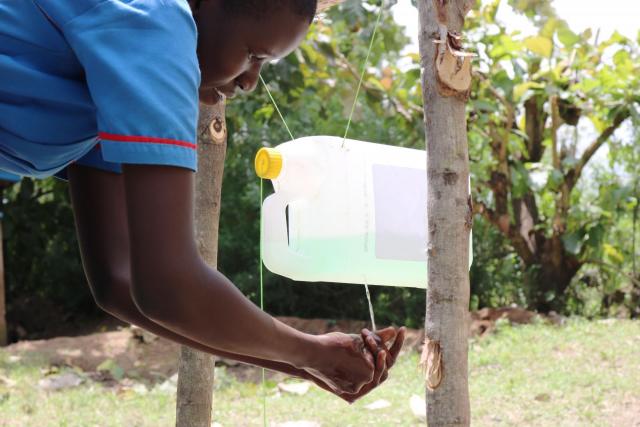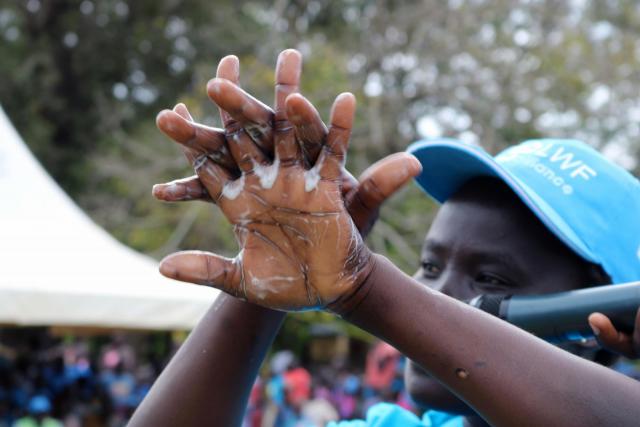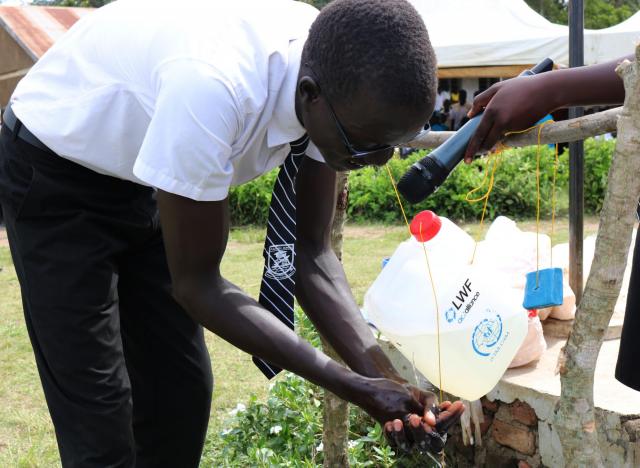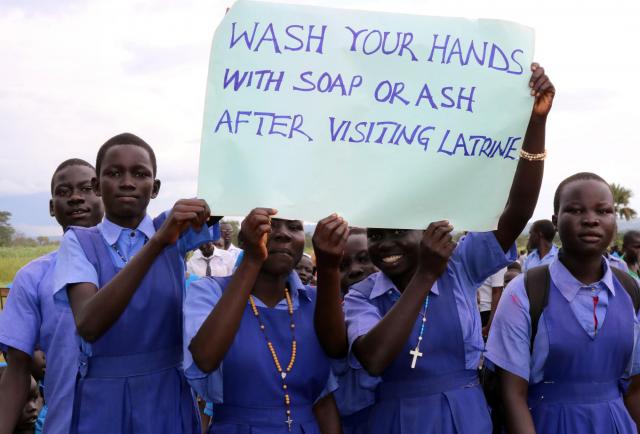Our hands, our health, our future

Moyo - The communities of Itula and Obongi sub counties in Moyo district have been taught better ways of washing hands in order to avoid infection. Demonstrating to the over 1,000 people who gathered at Chinyi primary school in Obongi to commemorate the Global Hand Washing Day, the Itula sub-county LC III chairperson, Abdallah Lomure, urged people to wash their hands regularly especially before meals and after using the lavatory.
“Use soap, if you can’t afford it, use ash and water to wash and kill germs in your hands,” Lomure advised the public explaining that ash is also a disinfectant.
Lamure sensitised hundreds of South Sudanese refugees from Palorinya settlement, host community residents, school children, local leaders, humanitarian and civil staff on sanitation and hygiene during the event organised by the Moyo Local District Council, in collaboration with the Lutheran World Federation with funds from the International Organization for Migration on 18/10/2017.

With a theme of ‘Our hands, our future,’ sanitation and hygiene was the day’s gospel, with emphasis on hand washing, through music, dance and drama. Through these, people were trained on the set up and usage of tippy taps for hand washing, the most appropriate way to wash hands thoroughly and how to use ash as an alternative in case soap is inaccessible.
“Wet your hands with clean water, apply soap or ash, wash your palms to the wrist, wash your fingers and fingernails, then, wash between your fingers. Do this at least five times in a wash, and endeavour to dry them with a clean cloth,” demonstrated Joyce Andrua, the Metu sub-county Health Assistant who continued to say that many people wash their hands regularly but only a few wash them clean.

Just like Andrua, results from a survey by the National Hand Washing Campaign (NHWC) implemented in 2012/2013 indicate that only 27 percent of people who used lavatories, washed their hands long enough to kill the germs that can cause infections. The case study titled: "Hand Washing With Soap (HWWS) in Uganda", was done in 30 districts based on household observations and schools, focusing on how people in their homes and school children use soap after visiting lavatories.
Andrua assured the gathering that if they washed their hands regularly and thoroughly, especially after using the latrine and before meals, they will prevent over 80% of potential infections.
“By washing your hands regularly, as well as eating clean food and drinks, and using the latrine appropriately, you can prevent infections, like dysentery, diarrhoea, typhoid or cholera. You and your families will live healthy,” assured Andrua, explaining that it is the germs in the hands that partly cause the infections

Dominic Lomurechu, a District Health Inspector in charge of Obongi Sub county, Moyo District said that people would visit hospitals less frequently, save money and time if they could wash their hands thoroughly, to kill the germs.
“If we wash our hands often and thoroughly, we shall prevent diseases and play a role in achieving the third Sustainable Development Goal of good health and well being,” added Shyne Nyamate, an International Organisation for Migration (IOM) Project Officer with LWF. “Good health will allow us build a better and productive future for ourselves, communities and the world at large.”
Nyamate continued to say that handwashing with soap does not only protects us from diseases but also improves children’s access to education, facilitates our fight against poverty and hunger as good health leads to a healthy mind for education and a strong body for earning a living through work.
“IOM will continue working with LWF to promote the benefits and practices of handwashing with soap, and also foster access to hygiene facilities among the people of Palorinya settlement,” said Julius Isingoma, a sanitation and hygiene Project Officer in Moyo district.

Representing the Office of the Prime Minister, Bashir Mawa, the Deputy Commandant of Palorinya settlement, advised the people to avoid open defecation and use lavatories appropriately.
Mawa called on the refugee community to put the cultural preconceptions against latrine use aside if they wish to live healthy lives. “No matter your culture and where you come from, use latrines and wash your hands clean after use.”

LWF appreciates IOM’s support towards its humanitarian activities aimed at improving sanitation and hygiene among the people of Palorinya settlement.
#GlobalHandWashingDay

